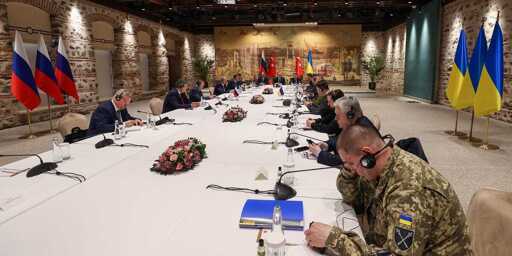Text from hard paywall:
For a brief period, Kyiv and allied European capitals were hopeful that President Trump’s public frustration with Russian counterpart Vladimir Putin and threats of new sanctions on his government meant that the US was not abandoning the Ukraine proxy war after all.
That moment has now passed. In the aftermath of last week’s first Russia-Ukraine talks in three years, and a follow-up phone call between Trump and Putin on Monday, the US president is no longer talking tough against Moscow. Instead, the growing consensus is that Trump is set on walking away from a conflict that he has repeatedly stressed is “not my war.” According to European officials, “Trump never seemed invested in joining sanctions on Russia,” and his threats “appeared largely performative.” Their new impression is that Trump believes that “the war [is] Europe’s problem.”
Rather than broker talks himself, Trump has passed the mediation role to the Vatican. “I think something’s going to happen,” Trump said after speaking with Putin on Monday. “And if it doesn’t, I just back away and they’re going to have to keep going.”
Without US support, Ukraine cannot keep it going much longer. No one understands this more than Ukrainian president Volodymyr Zelensky and his aides. “It will be extremely difficult without Americans,” a senior Ukrainian official told Politico. Accordingly, the Ukrainian strategy to keep the US from walking away has been to “say what Trump wants to hear.”
Trump is not listening. Earlier this month, Zelensky, along with France’s Emmanuel Macron and the UK’s Keir Starmer, won Trump’s support for an ultimatum demanding that Russia accept a 30-day ceasefire or face new sanctions. Putin shrugged off the demand and instead proposed that Russia and Ukraine hold direct talks in Istanbul. Rather than stick with the ultimatum, Trump immediately endorsed Putin’s idea and instructed Zelensky to follow suit.
Forced to drop his ultimatum, Zelensky tried to save face by challenging Putin to join him in Istanbul, thereby ignoring his own presidential decree, which forbids diplomacy with the Russian president. Putin again ignored Zelensky and sent a delegation led by officials who conducted the peace talks in that same city in April 2022. Istanbul, Putin said, is where Russia-Ukraine negotiations “were interrupted… at the insistence of the West.”
Having obeyed the US and UK’s insistence on rejecting peace back then, Zelensky was now confronted with resuming the peace talks that he had abandoned. To cope, Zelensky dismissed the Russian delegation as powerless, low-level bureaucrats, and minimized the progress made with his team three years ago. “They are doing everything they can to turn this Istanbul meeting into a staged empty process just like the one in 2022,” Zelensky said of the Russian side. “It’s not us or the West who are disrupting the negotiations … It’s the Russians who send empty heads to talks.”
Piling on, NATO Secretary General Mark Rutte declared that “Putin made a mistake by sending a low-level delegation,” including a top official “who was also there in the talks in 2022,” – a non-starter for NATO, which wishes to forget that those 2022 talks ever happened. Putin, Rutte added, “has to play ball.” The Washington Post, part of a media establishment that has ignored and distorted that sabotaged Istanbul talks, reported on the new round by declaring that Russia’s 2022 demands “would have left Ukraine unable to defend itself from a future Russian attack,” and are “widely seen as amounting to Ukraine’s surrender.”
Despite the prevailing consensus around the “staged empty process” and Ukraine’s forced “surrender” of April 2022, Ukrainian negotiators from that time have acknowledged that a substantive deal was at hand until the US and UK stood in the way. “We managed to find a very real compromise,” Oleksandr Chalyi, a senior member of the Ukrainian negotiating team, later recalled, with Putin having “tried to do everything possible” to make peace. According to former Zelensky advisor Oleksiy Arestovich, “the Istanbul peace initiatives were very good.”
Three years later, Russia is in no mood to reward Zelensky for nixing a deal that his own negotiators recognized as a welcome compromise. Moscow is now seeking not only Ukraine’s commitment to neutrality, but its full withdrawal from Donetsk, Lugansk, Kherson, and Zaporozhia, the four Ukrainian provinces that Russia has claimed as its own. In Istanbul last week, lead Russian negotiator Vladimir Medinsky reportedly warned his Ukrainian counterparts that “we’re ready to fight for a year, two, three—however long it takes.”
Vowing to stay in the Ukraine fight for “as long it takes” was once Joe Biden’s mantra as well, a promise now long forgotten, and newly overshadowed by revelations about the cover-up of his cognitive impairment. Instead, the former head of Ukraine’s military, Valery Zaluzhnyi, who now serves as Ukraine’s ambassador to London, admitted this week that Zelensky’s stated goal of recapturing all of Ukraine’s territory is impossible. “I hope that there are not people in this room who still hope for some kind of miracle or lucky sign that will bring peace to Ukraine, the borders of 1991 or 2022, and that there will be great happiness afterward," Zaluzhnyi told a Kyiv audience. “My personal opinion is that the enemy still has resources, forces and means to launch strikes on our territory and attempt specific offensive operations.”
Zaluzhnyi issued a similar warning back in November 2023, when he acknowledged the failure of Ukraine’s much-hyped counteroffensive by stating that there would “be no deep and beautiful breakthrough.” Zaluzhnyi made that comment at a time when the US was still committed to Biden’s strategy of flooding Ukraine with weaponry in order to bleed Russia. With Washington no longer invested in that project, Zelensky will have a hard time convincing his suffering population that they need to stay the course.


